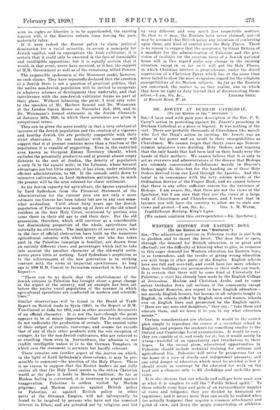WESTERN HISTORY FOR EASTERN BOYS.
[To THE EDITOR OP THE " SPECTATOR."' Sia,—The educational position in Palestine to-day is one both to gladden and to daunt the heart. The door that is open, through the demand for British education, is so great and effectual; yet the difficulty of knowing what to give, in response to this eager demand for Western education for Eastern boys, is so tremendous, and the results of giving wrong education are writ large in other parts of the Empire. English schools here are full and over-full, and could have far more scholars than their buildings can accommodate or their staffs can teach. It is certain that there will be some kind of University far Palestine; a start has already been made by the English College at Jerusalem. Moslem and Christian Arabs, and to some extent Orthodox Jews (all sections of the community except the militant Zionists), are urgent to have English education— not merely English lessons, but lessons in all subjects taught in English, in schools staffed by English men and women, schools run on English lines and permeated by the English spirit. "Here are our sons and daughters," they say; " take them and educate them, and we leave it to you to say what education means."
Certain considerations are obvious. It would be the easiest plan simply to reproduce the course of a secondary school in England, and prepare the students for something similar to the Oxford and Cambridge Local examinations. It would be easy; they are capable of it, and ready for it; but it would surely be wrong—wasteful of an opportunity and treacherous to their hopes. In the second place, educational opportunities in Palestine should include technical training for artisans and agricultural life. Palestine will never be prosperous but as the home of a race of sturdy and independent peasants; and one vital danger of education which must be avoided is lest it should result in contempt by the educated for work on the land and a clamour only to fill clerkships and such-like posi- tions.
It is also obvious that our schools and colleges here must aim at what it is simplest to call the "Public School spirit." To these schools come boys and girls of an extraordinary number of races and religions; they are divided by historical an- tagonisms; and it means more than can easily be realized when (as actually happens) they acquire a common attachment and point of view, and learn the magic comradeship of athletic& Jerusalem is undoubtedly fortunate that it has had schools.
like St. George's and the Bishop Gobat, which have developed along these lines so strongly in the past that the people of Palestine know and ask for this element in education.
Finally, it should be a principle of British schools that they should insist upon and make much of the scholarly study of the native languages of the scholars and their literature and his- tory. This has been done, and the time-tables are picturesque with provision for the study not only of French, but also Arabic, Greek, Hebrew, Russian, and Armenian, and, until recently, Turkish.
But the bigger question still remains to solve: What is education, such as a Western school should give to Eastern boys, to fit them for the future destiny in a land that will henceforth be in vital contact with the West? To get leading ideas on the whole subject it may be well to concentrate prac- tically upon one subject. The students must learn history. What, then, shall be their history course? History is so rich and instructive a subject that the study of any period is inter- esting and helpful. But only a limited time—far too little-- can be given to it in the school curriculum. Allowing one hour a week (with incidental lectures and references in reading- books), is it possible to lay out a course of any real value?
The line at present being followed is to group all the history teaching round three points: the land of Palestine; periods of vital contact between this land and Europe; and general history in mere outline. The first point must be treated. The second, perhaps, is the best fitted for instruction at this juncture, when again the destiny of the land is to be worked out in close con- tact with Europe; the study of the times of Alexander, of Roman rule, and Byzantine, and of the Crusades, is vital. As to the third, it admits of study of Greece and Rome and vital periods of European history, such as put a stamp upon human progress for centuries.
Might we be helped with advice? Will keen historians come and give us courses of lectures ? Will some one write us a The English College, Jerusalem.
[We have been compelled to abbreviate Canon Waddy's in- teresting letter.—ED. Spectator.]



































 Previous page
Previous page